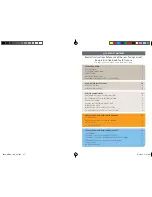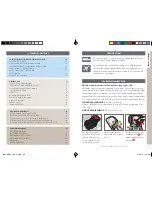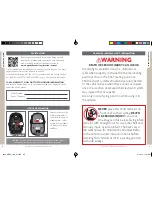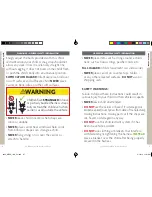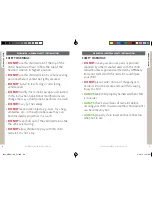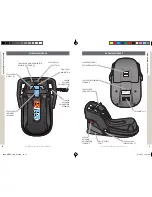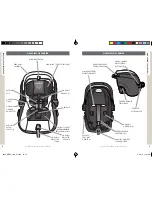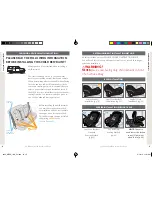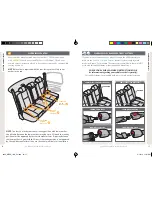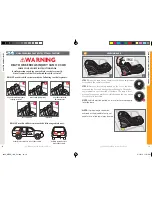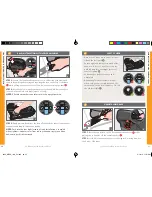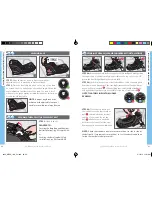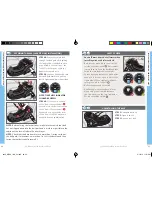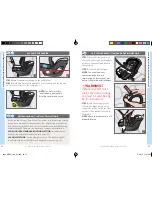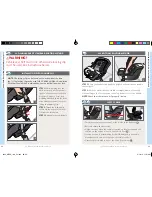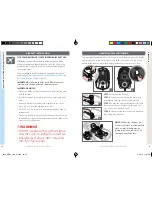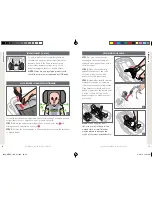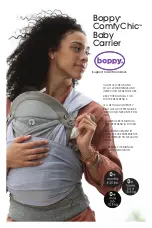
3
UPPAbaby MESA Instruction Book
TABLE OF CONTENTS
USE RECOMMENDATIONS
Children should remain rear-facing for as long as possible.
UPPAbaby
and the American Academy of Pediatrics
®
advise parents to keep
their toddlers in rear-facing car seats until age 2, or until they reach maximum
height and weight for their seat. Do not use this child restraint beyond the
expiration date or if the child outgrows either the weight or height requirements.
This child restraint is for use by children who meet BOTH requirements below:
WEIGHT REQUIREMENTS:
4-35 lbs (1.8-15.9 kg)
Includes Infant Insert recommended for use with infants weighing 4-8 lbs
(1.8-3.6 kg)
HEIGHT REQUIREMENTS:
32 in (81.3 cm) or less
This child restraint system conforms to all applicable Federal
Motor Vehicle Safety Standards (FMVSS).
This child restraint is certified for aircraft use. UPPAbaby and
the Federal Aviation Administration (FAA) strongly urge you to
secure your child in a child restraint system (CRS) or device for
the duration of your flight.
CERTIFICATION
The top of the child’s
head should not be less
than 1 in from the top
of the headrest when
in its highest position.
Harness should be at
the shoulders or slightly
below.
Retainer clip must be
at armpit level and
harness straps should
be snug .
BEFORE Y
OU BEGIN
CARE + MAINTENANCE
41
SIP PADDING REMOVAL
41
SEAT PADDING REMOVAL
42
SEAT PADDING INSTALLATION
44
SIP PADDING INSTALLATION
46
CLEANING
47
LIMITED WARRANTY
48
GENERAL USE
31
HARNESS BUCKLE POSITIONING
31
INFANT INSERT (RECOMMENDED 4-8 LBS)
32
SIP CA HARNESS POSITIONING
32
SECURING YOUR CHILD
33
PINCH TEST
34
ATTACHING CARRIER TO BASE
35
RELEASING CARRIER FROM BASE
35
HIDE-AWAY CANOPY
36
CARRY HANDLE
36
IMPORTANT CHECKS
37
CARRIER INSTALLATION WITH VEHICLE SEAT BELT
26
LEVELING THE CARRIER
26
DETERMINING BEST INSTALLATION METHOD
26
LAP/SHOULDER BELT STANDARD ROUTING METHOD
27
INSTALLATION WITH LOCKING CLIP
28
LAP BELT ONLY ROUTING METHOD
29
SAFETY CHECK
29
AIRCRAFT INSTALLATION
30
STROLLER COMPATIBILITY
38
FITTING CARRIER TO STROLLER FRAME
38
RELEASING CARRIER FROM STROLLER FRAME
38
FITTING ADAPTERS TO VISTA 2014 AND EARLIER FRAME
39
FITTING CARRIER TO VISTA 2014 AND EARLIER FRAME ADAPTERS
40
RELEASING CARRIER FROM VISTA 2014 AND EARLIER FRAME ADAPTERS
40
0225_MESA_INS_V4.indd 2-3
3/19/15 11:07 AM
Summary of Contents for mesa
Page 1: ...From 4 35 lbs ...


